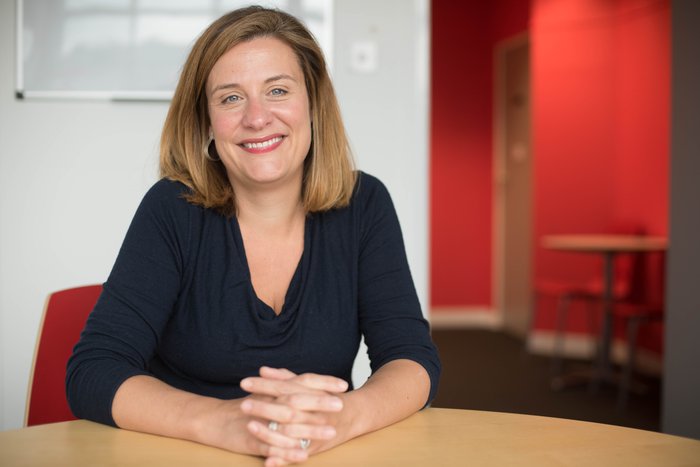What do we mean when we talk about beating blood cancer?
Our Chief Executive, Gemma Peters, is writing to update you on our organisational strategy. With the help of our community, we first looked at what we mean by beating blood cancer, and came up with an initial draft of a vision statement.
We’ve now started working in earnest on our new organisational strategy, and I’m writing this to give you an update on it.
I feel slightly tentative as I write these words, as I can already imagine the eyes of some of you will be glazing over as you read them. I know that when chief executives write about an organisational strategy, it can often seem inaccessible and sometimes feel generic and even like navel-gazing.
But I hope our blogs on this (and this is the first of a series of them!) will be relevant to everyone who cares about our charity and our cause.
Our work on developing this strategy isn’t about developing a corporate document with lots of buzzwords. It’s the opposite – it’s about making a series of big choices about what we do and how we do it that.
And the more of these choices we get right, the better position we’ll be in to play our role in beating blood cancer.
What does beating blood cancer mean to our community?
The first choice that we’ve made is about what “beating” blood cancer means. This is an important starting point for detailed discussions about the choices we need to make for the future.
We’ve used the word “beating” for many years, and it’s a word that many in our community (though definitely not all!) find really inspiring. But while it might feel inspiring, it’s an ambiguous word and we’ve never clearly defined what it means.
Does it mean we’ll find a cure for blood cancer?
Is “beating blood cancer” about creating a world where no one gets it? Or where people still get it but there’s a cure? Or where people still live with it, perhaps experiencing side-effects, but they don’t die of it? And does improving people’s mental health and making end-of-life care better also count towards “beating” it?
Us not having defined this has been useful in many ways, because it means it’s a banner that everyone affected by blood cancer can march behind. But because it can be as broad – as to mean anything that helps people affected by blood cancer – it doesn’t help us make decisions about what we should prioritise.
Given our limited resources, how do we decide whether to invest in a research project into a new treatment, or a service that will offer psychological support, or a campaign for better end-of-life care?
Given that they’re all valuable work where there is obvious need, without a clear organisational vision, the decision risks being based on what we can get funding for or, worse, what the most senior person in the room happens to think.
So the very first thing we need in developing our strategy is a vision that acts as a north star for every decision we make.
We asked you to take a survey to help shape our vision
In deciding what this vision should be, it was vital we understood what our community think of when they hear “beating blood cancer”. Thank you to the hundreds of you who completed our survey on it!
While there were lots of different views, two things stood out:
- The vast majority of people thought beating blood cancer is about funding research into better treatments, although a significant minority thought it meant support for patients.
- For many people, it means finding a cure or eradicating blood cancer completely. But, roughly the same proportion thought it was about improving survival rates, or making blood cancer a condition that people can live with.
Armed with this insight, we convened a small expert group, including two people who don’t work for the organisation but who have blood cancer.
We worked together to develop a vision that we thought would be true to what our community had told us. We’re so grateful to them for lending us their time.
Together, we came up with this vision statement:
We are focused on saving lives and bringing forward the day when no one dies of blood cancer, or their blood cancer treatment.
By this, we mean every case of blood cancer will either be prevented, cured, or treated in a way that does not reduce someone's life expectancy.
We believe this day is within reach and if we harness the strength of the blood cancer community, we will get there sooner.
This wasn’t about creating the most compelling piece of writing – that can come later. We just wanted to get down, simply and precisely, a definition of what “beating” means. Our aim was to get rid of any ambiguity.
We checked this with our Involvement Group – a group of people affected by blood cancer who had told us they wanted to be involved in developing our strategy – and within a couple of days, more than 100 of them had responded.
Most of those people thought it was an inspiring vision, though a few of them said they would have liked it to be more ambitious. In the sense that our vision should be to completely cure all blood cancers rather than just getting to the day when no one dies of it.
We also asked our staff via a survey, and they told us they agreed it was inspiring. Most of them thought that it would make it easier to make decisions. Interestingly, while some in the community thought it wasn’t ambitious enough, in our staff group, people were more likely to say it was too ambitious.
The positive response means that we’re now using this draft vision statement as we develop the rest of the strategy. And we will refine it throughout the process.
What will we be looking at next?
Over the next few weeks, groups of staff and people affected by blood cancer will spend time making choices that will set Blood Cancer UK’s direction over the next few years.
These choices will cover a wide range of things – what research we fund, the focus of support services, our fundraising, and how we make sure that we are an inclusive organisation that is there for everyone affected by blood cancer.
But while these choices are wide-ranging, they will all be guided by a single question – which decision will bring us most quickly to the day when all blood cancers are either prevented, cured or treated in a way that doesn’t reduce someone’s life expectancy.
Get involved – help us shape our strategy
We’d love to know what you think of our draft vision statement. If you have thoughts on what approach we should be taking over the next few years – please email our Strategy Team.
If you’d like to be part of our Involvement Group that regularly checks our work in helping us to develop our strategy, please email our Strategy Team.


